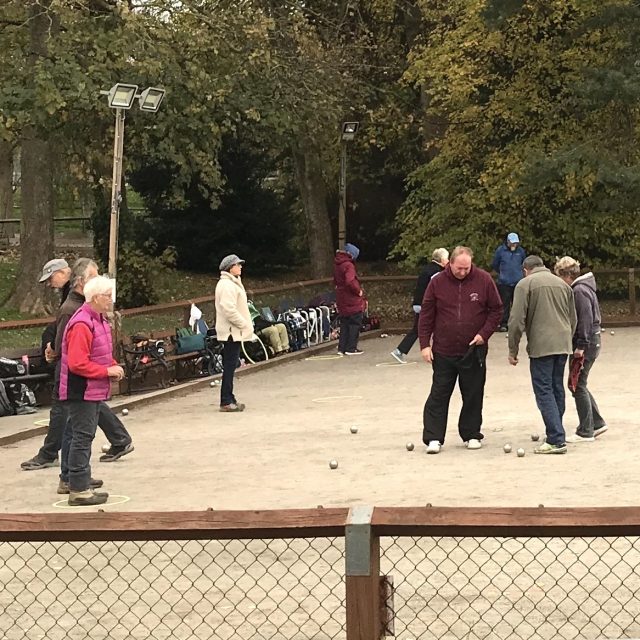PETANQUE BASICS
Petanque is played with hollow steel balls known as boules, and a small wooden target ball or jack. The game is usually played on a gravel-topped terrain at least 12m long, but this need not to be a purpose-built area and petanque can be played informally on many other types of surface, such as a sandy beach..
Games can be played as either:
- Singles: Two individual players, each with 3 boules;
- or Doubles: Two teams of two players, with 3 boules per player;
- or Triples: Two teams of three players, with 2 boules per player
Boules are supplied in sets of three, all with identical markings called striations. These help to identify each player’s boules during a game.
HOW TO PLAY A GAME
- The two teams toss a coin to decide who starts first.
- A player from the starting team draws a circle on the ground and then, standing with both feet in the circle, throws the target jack out to a distance of 6 to 10 meters.
- The starting team’s player then throws their first boule, trying to get it close to the jack.
- Next, a player from the second team stands in the circle and tries to get their boule closer to the jack than the opposing team. They can do this simply throwing their boule so it ends up closer; or by knocking into the opposing team’s boule and moving it away.
- If that team succeeds in getting their boule closer than all of its opponents boules, then the opposing team now has to attempt to throw a boule closer.
- The team which does not have the closest boule to the jack after each throw, keeps throwing their boules until either they get closest, or they run out of boules to throw, at which point it is the other team’s turn to play.
- When all boules from both teams have been thrown, that is the conclusion of an ‘end’. Points are awarded for each boule that is closer to the jack than the other team’s closest boule, and these points are are added to the running score. That is, if team A has two of its boules closer to the jack than opposing team’s closest boule, then team A gets two points added to their score and is said to have ‘won the end’.
- The team who won the previous end, starts the next one by drawing a circle around the current position of the jack and using that as the starting position.
- Play continues in this way until one team reaches 13 points, at which point they have won the game. There is no limit on the number of ends that can be played in a game.
TIPS AND TERMINOLOGY
- Boules are usually thrown underarm with the palm facing down, and lobbed through the air rather than rolled along the ground. This technique is not specifically required by the rules, but it allows the use of backspin and gives better control of the boule.
- A prefabricated plastic ‘ring’ can be used to stand in as an alternative to drawing a circle on the ground
- To ‘point‘ is to throw a boule so that it stops close to the jack
- To ‘shoot‘ is to hit an opponent’s boule out of the way, or move it further from the jack
- There are no rules restricting which members of a team can point or shoot, but often players specialise in one or other of these skills, and so refer to themselves as a ‘pointer‘ or a ‘shooter‘
- Cochonnet (or ‘coche’) is an informal name for the jack, from the French ‘little pig’.
- To be ‘Fannied‘ is to lose a game without scoring any points – i.e. 0 : 13
TRY A CLUB
There are over 150 affiliated petanque clubs across England, so you should find one or more in your local area. All of our clubs welcome new players, including absolute beginners who have never played before.
You can visit a club to ‘come and try’ up to three times absolutely free and with no commitment. If you enjoy the sport and want to continue you will be invited to join both the club and Petanque England, and you will find many many opportunities to play all year round.
You can choose your own level of play, whether you just want an occasional social game on a sunny day, or to join a local league, or even play in regional, national or international competitions. All things are possible!




